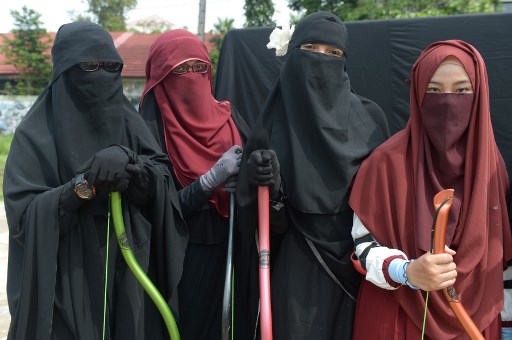An Islamic university in the city of Yogyakarta is at the center of a religious controversy over its decision to ban the niqab (face-covering veil worn by Muslim women) on campus.
The dean of Sunan Kalijaga Islamic State University (UIN), Yudian Wahyudi, announced the school would enforce a niqab ban on the university’s premises, threatening violators of the policy with expulsion.
“There are 41 that we noted were wearing the niqab from all faculties on campus,” Yudian said as quoted by Viva yesterday.
“If they dare [to wear the niqab], then please leave the campus. If the policy is wrong, I’m ready to be fired.”
Yudian said the no niqab policy has actually existed for a long time and that all students were made aware of the regulation when they joined the university.
However, Yudian’s justification for enforcing the policy is not due to practical reasons, such as preventing identity fraud. Instead it seems be driven (rather ironically for an Islamic university) by the idea, held by many Islamophobes, that the niqab is inherently associated with Islamic radicalism.
“We also know that students who wear the niqab tend to forget about their parents. The university is going to communicate with the parents of the niqab wearing students,” Yudian said.
Yudian also indicated that UIN will fire niqab-wearing professors, as well as educators who have proven to have links to radical groups like Hizbut Tahrir Indonesia (HTI), which was banned by the government last year.
Research and Higher Education Minister Mohamad Nasir said women had the right to wear whatever they want, but recognized that UIN might have its own reasons for enacting the ban.
“I leave it to the dean for issues like that,” Mohamad said yesterday, as quoted by Viva.
Umi Kalsum, a student at UIN who wears a niqab, said there have never been any prohibitions against the face veil until recently, which she believes is a knee-jerk reaction to rumors that radical groups have infiltrated the university.
“If they tell me to take it off, I will ask why because I wear the veil for me. There are many reasons [why I wear it], they’re private,” she told Viva.
Although Indonesia is a Muslim-majority country in which a large percentage of Muslim women wear hijab (headscarves), the number of women who wear the niqab is relatively quite small, though there is evidence to suggest it is slowly becoming more mainstream. However, many who wear the face veil here say they are still looked upon with suspicion and get “weird looks” while out in public spaces.




